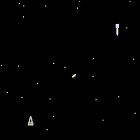 At the 1962 Open House held at the Massachusetts Institute of Technology, a student programming project is unveiled on the school’s new DEC PCP-1 computer. In an attempt to demonstrate the machine’s real-time processing power in a context that can be understood by the general public, Steve Russell and his cohorts allow visitors to play the first computer game, Spacewar. The product of months of design and hundreds of man-hours of coding, Spacewar allows two players to navigate their way around the gravity of a sun while trying to blow each other to bits (as displayed on a round oscilloscope). Never patented or copyrighted, Spacewar goes on to “inspire” countless copies, including one of the earliest coin-operated arcade video games, Computer Space.
At the 1962 Open House held at the Massachusetts Institute of Technology, a student programming project is unveiled on the school’s new DEC PCP-1 computer. In an attempt to demonstrate the machine’s real-time processing power in a context that can be understood by the general public, Steve Russell and his cohorts allow visitors to play the first computer game, Spacewar. The product of months of design and hundreds of man-hours of coding, Spacewar allows two players to navigate their way around the gravity of a sun while trying to blow each other to bits (as displayed on a round oscilloscope). Never patented or copyrighted, Spacewar goes on to “inspire” countless copies, including one of the earliest coin-operated arcade video games, Computer Space.
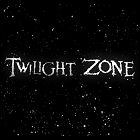 The 99th episode of Rod Serling’s The Twilight Zone airs on CBS. Phyllis Thaxter and Alex Nicol star.
The 99th episode of Rod Serling’s The Twilight Zone airs on CBS. Phyllis Thaxter and Alex Nicol star.
This series is not yet fully chronicled in the LogBook. You could help change that.
More about The Twilight Zone in the LogBook and theLogBook.com Store
The Twilight Zone now streaming on Paramount Plus
 The 100th episode of Rod Serling’s The Twilight Zone airs on CBS. Josephine Hutchinson and David White star in a Serling adaptation of Ray Bradbury’s short story of the same name.
The 100th episode of Rod Serling’s The Twilight Zone airs on CBS. Josephine Hutchinson and David White star in a Serling adaptation of Ray Bradbury’s short story of the same name.
This series is not yet fully chronicled in the LogBook. You could help change that.
More about The Twilight Zone in the LogBook and theLogBook.com Store
The Twilight Zone now streaming on Paramount Plus
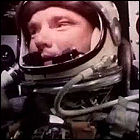 The second American orbital flight is launched, with Scott Carpenter lifting off aboard Mercury 7 (nicknamed Aurora 7). Carpenter’s five-hour, three-orbit mission is almost a carbon copy of John Glenn’s orbital flight, the primary goal being to duplicate the flight and compare the two astronauts’ reports and reactions.
The second American orbital flight is launched, with Scott Carpenter lifting off aboard Mercury 7 (nicknamed Aurora 7). Carpenter’s five-hour, three-orbit mission is almost a carbon copy of John Glenn’s orbital flight, the primary goal being to duplicate the flight and compare the two astronauts’ reports and reactions.
 The 101st episode of Rod Serling’s The Twilight Zone airs on CBS. Jesse White and Carol Burnett star in an episode written by Serling.
The 101st episode of Rod Serling’s The Twilight Zone airs on CBS. Jesse White and Carol Burnett star in an episode written by Serling.
This series is not yet fully chronicled in the LogBook. You could help change that.
More about The Twilight Zone in the LogBook and theLogBook.com Store
The Twilight Zone now streaming on Paramount Plus
 The 102nd episode of Rod Serling’s The Twilight Zone airs on CBS. Donald Pleasance and Liam Sullivan star in the third season finale, written by Serling.
The 102nd episode of Rod Serling’s The Twilight Zone airs on CBS. Donald Pleasance and Liam Sullivan star in the third season finale, written by Serling.
This series is not yet fully chronicled in the LogBook. You could help change that.
More about The Twilight Zone in the LogBook and theLogBook.com Store
The Twilight Zone now streaming on Paramount Plus
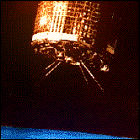 NASA and the United States Weather Bureau launch the fifth experimental TIROS weather satellite, TIROS-5. Further refinements to the basic TIROS satellite system are made, including new systems designed to keep the satellite in orbit – and in service – for a much longer period of time. A problem with the Delta rocket used to launch TIROS-5 puts the satellite in an elliptical orbit which is maintained for less than six months.
NASA and the United States Weather Bureau launch the fifth experimental TIROS weather satellite, TIROS-5. Further refinements to the basic TIROS satellite system are made, including new systems designed to keep the satellite in orbit – and in service – for a much longer period of time. A problem with the Delta rocket used to launch TIROS-5 puts the satellite in an elliptical orbit which is maintained for less than six months.
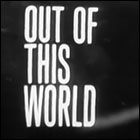 British broadcaster ABC airs an episode of the play anthology series Armchair Theatre, Dumb Martian, adapted by Clive Exton from a story by John Wyndham. Originally intended to be the pilot of an all-science-fiction anthology called Out Of This World, this episode is aired as an episode of Armchair Theatre by a decision from producer (and future Doctor Who creator) Sydney Newman, whose protege, Irene Shubik, will be the new anthology’s story editor. Out Of The World begins its short run on ABC a week later. This episode no longer exists in the archives.
British broadcaster ABC airs an episode of the play anthology series Armchair Theatre, Dumb Martian, adapted by Clive Exton from a story by John Wyndham. Originally intended to be the pilot of an all-science-fiction anthology called Out Of This World, this episode is aired as an episode of Armchair Theatre by a decision from producer (and future Doctor Who creator) Sydney Newman, whose protege, Irene Shubik, will be the new anthology’s story editor. Out Of The World begins its short run on ABC a week later. This episode no longer exists in the archives.
More about Out Of This World and Out Of The Unknown in the LogBook
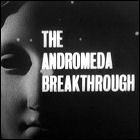 The first episode of the British science fiction series The Andromeda Breakthrough, created and written by John Elliot and astronomer Fred Hoyle as a follow-up to 1961’s A For Andromeda, is broadcast on the BBC, starring Peter Halliday, Susan Hampshire, John Hollis (The Empire Strikes Back), and Mary Morris. Unlike A For Andromeda, this series exists in the BBC archives in its entirety.
The first episode of the British science fiction series The Andromeda Breakthrough, created and written by John Elliot and astronomer Fred Hoyle as a follow-up to 1961’s A For Andromeda, is broadcast on the BBC, starring Peter Halliday, Susan Hampshire, John Hollis (The Empire Strikes Back), and Mary Morris. Unlike A For Andromeda, this series exists in the BBC archives in its entirety.
This series is not yet chronicled in the LogBook. You could help change that.
 British broadcaster ABC airs the first episode of science fiction anthology series Out Of This World. Adapted by Leon Griffiths from a story by Rog Phillips, the story stars Nigel Stock and is introduced by Boris Karloff (in much the same way that Rod Serling introduced episodes of The Twilight Zone). This script will be reused in 1969 during the third season of the BBC’s anthology series Out Of The Unknown, whose original producer, Irene Shubik, is script editor of Out Of This World. This episode no longer exists in the archives.
British broadcaster ABC airs the first episode of science fiction anthology series Out Of This World. Adapted by Leon Griffiths from a story by Rog Phillips, the story stars Nigel Stock and is introduced by Boris Karloff (in much the same way that Rod Serling introduced episodes of The Twilight Zone). This script will be reused in 1969 during the third season of the BBC’s anthology series Out Of The Unknown, whose original producer, Irene Shubik, is script editor of Out Of This World. This episode no longer exists in the archives.
More about Out Of This World and Out Of The Unknown in the LogBook
 The second episode of the British science fiction series The Andromeda Breakthrough, created and written by John Elliot and astronomer Fred Hoyle as a follow-up to 1961’s A For Andromeda, is broadcast on the BBC, starring Peter Halliday, Susan Hampshire, John Hollis (The Empire Strikes Back), and Mary Morris. Unlike A For Andromeda, this series exists in the BBC archives in its entirety.
The second episode of the British science fiction series The Andromeda Breakthrough, created and written by John Elliot and astronomer Fred Hoyle as a follow-up to 1961’s A For Andromeda, is broadcast on the BBC, starring Peter Halliday, Susan Hampshire, John Hollis (The Empire Strikes Back), and Mary Morris. Unlike A For Andromeda, this series exists in the BBC archives in its entirety.
This series is not yet chronicled in the LogBook. You could help change that.
 The United States launches the Starfish Prime high-altitude nuclear weapons test, detonating a 1.4 megaton warhead at an altitude of 250 miles, the largest space-based nuclear test to date. The flash of the detonation creates a brief “false sunrise” over much of the Pacific Ocean, as well as an unusual auroral display resulting from the sudden release of charged particles trapped within Earth’s magnetic field. An electromagnetic pulse is also observed, more powerful than expected, causing some damage to the Hawaiian power grid. The radiation released in low Earth orbit also interferes with some satellites, including shortening their operational life spans (this includes the Telstar communications satellite, not launched until the next day). Starfish Prime is part of the “Fishbowl” series of high-altitude nuclear tests.
The United States launches the Starfish Prime high-altitude nuclear weapons test, detonating a 1.4 megaton warhead at an altitude of 250 miles, the largest space-based nuclear test to date. The flash of the detonation creates a brief “false sunrise” over much of the Pacific Ocean, as well as an unusual auroral display resulting from the sudden release of charged particles trapped within Earth’s magnetic field. An electromagnetic pulse is also observed, more powerful than expected, causing some damage to the Hawaiian power grid. The radiation released in low Earth orbit also interferes with some satellites, including shortening their operational life spans (this includes the Telstar communications satellite, not launched until the next day). Starfish Prime is part of the “Fishbowl” series of high-altitude nuclear tests.
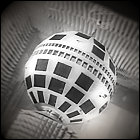 The first Telstar communications satellite is launched, the first attempt to forge a permanent trans-Atlantic telecommunications link with an satellite that both receives and actively retransmits signals. A multinational venture between communications companies and government agencies in America, England and France, Telstar relays the first live trans-Atlantic television broadcast, bringing together the three major American networks of the time and the BBC for a one-of-a-kind joint news broadcast. Live intercontinental telephone calls and other TV broadcasts are also handled by Telstar. Though it’s an experimental satellite, Tesltar is expected to remain in service for some time, but its operational life is reduced to less than a year by, among other things, the effects of high-altitude nuclear weapons tests. Telstar shuts down in February 1963, but remains in orbit to this day.
The first Telstar communications satellite is launched, the first attempt to forge a permanent trans-Atlantic telecommunications link with an satellite that both receives and actively retransmits signals. A multinational venture between communications companies and government agencies in America, England and France, Telstar relays the first live trans-Atlantic television broadcast, bringing together the three major American networks of the time and the BBC for a one-of-a-kind joint news broadcast. Live intercontinental telephone calls and other TV broadcasts are also handled by Telstar. Though it’s an experimental satellite, Tesltar is expected to remain in service for some time, but its operational life is reduced to less than a year by, among other things, the effects of high-altitude nuclear weapons tests. Telstar shuts down in February 1963, but remains in orbit to this day.
 The third episode of the British science fiction series The Andromeda Breakthrough, created and written by John Elliot and astronomer Fred Hoyle as a follow-up to 1961’s A For Andromeda, is broadcast on the BBC, starring Peter Halliday, Susan Hampshire, John Hollis (The Empire Strikes Back), and Mary Morris. Unlike A For Andromeda, this series exists in the BBC archives in its entirety.
The third episode of the British science fiction series The Andromeda Breakthrough, created and written by John Elliot and astronomer Fred Hoyle as a follow-up to 1961’s A For Andromeda, is broadcast on the BBC, starring Peter Halliday, Susan Hampshire, John Hollis (The Empire Strikes Back), and Mary Morris. Unlike A For Andromeda, this series exists in the BBC archives in its entirety.
This series is not yet chronicled in the LogBook. You could help change that.
 British broadcaster ABC airs the third episode of science fiction anthology series Out Of This World. Adapted by Clive Exton from a story by Tom Godwin, the story stars Peter Wyngarde and Jane Asher, and is introduced by Boris Karloff (in much the same way that Rod Serling introduced episodes of The Twilight Zone).
British broadcaster ABC airs the third episode of science fiction anthology series Out Of This World. Adapted by Clive Exton from a story by Tom Godwin, the story stars Peter Wyngarde and Jane Asher, and is introduced by Boris Karloff (in much the same way that Rod Serling introduced episodes of The Twilight Zone).
More about Out Of This World and Out Of The Unknown in the LogBook
 The fourth episode of the British science fiction series The Andromeda Breakthrough, created and written by John Elliot and astronomer Fred Hoyle as a follow-up to 1961’s A For Andromeda, is broadcast on the BBC, starring Peter Halliday, Susan Hampshire, John Hollis (The Empire Strikes Back), and Mary Morris. Unlike A For Andromeda, this series exists in the BBC archives in its entirety.
The fourth episode of the British science fiction series The Andromeda Breakthrough, created and written by John Elliot and astronomer Fred Hoyle as a follow-up to 1961’s A For Andromeda, is broadcast on the BBC, starring Peter Halliday, Susan Hampshire, John Hollis (The Empire Strikes Back), and Mary Morris. Unlike A For Andromeda, this series exists in the BBC archives in its entirety.
This series is not yet chronicled in the LogBook. You could help change that.
 British broadcaster ABC airs the fourth episode of science fiction anthology series Out Of This World. Adapted by Terry Nation (who will create the Daleks, Doctor Who’s most enduring foes, a year later) from a story by Philip K. Dick, the story stars Patrick Allen, and is introduced by Boris Karloff (in much the same way that Rod Serling introduced episodes of The Twilight Zone). This episode no longer exists in the archives, though a fan-made audio recording survives.
British broadcaster ABC airs the fourth episode of science fiction anthology series Out Of This World. Adapted by Terry Nation (who will create the Daleks, Doctor Who’s most enduring foes, a year later) from a story by Philip K. Dick, the story stars Patrick Allen, and is introduced by Boris Karloff (in much the same way that Rod Serling introduced episodes of The Twilight Zone). This episode no longer exists in the archives, though a fan-made audio recording survives.
More about Out Of This World and Out Of The Unknown in the LogBook
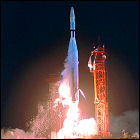 NASA launches the JPL-built unmanned space probe Mariner 1, the first of two identical spacecraft intended to study the planet Venus. Mariner 1’s mission, however, is cut short before it even leaves Earth’s atmosphere: a communication loss between its Atlas-Agena booster rocket and ground-based control systems sends the rocket off course. Fearing that it might tumble into the Atlantic Ocean’s heavily traveled shipping lanes, NASA orders the vehicle to self-destruct in mid-air. Many later accounts lay the blame at an error in the code loaded into the rocket’s on-board guidance computer. Mariner 1’s mission objectives are transferred to its identical twin, Mariner 2, due to be launched in just over a month.
NASA launches the JPL-built unmanned space probe Mariner 1, the first of two identical spacecraft intended to study the planet Venus. Mariner 1’s mission, however, is cut short before it even leaves Earth’s atmosphere: a communication loss between its Atlas-Agena booster rocket and ground-based control systems sends the rocket off course. Fearing that it might tumble into the Atlantic Ocean’s heavily traveled shipping lanes, NASA orders the vehicle to self-destruct in mid-air. Many later accounts lay the blame at an error in the code loaded into the rocket’s on-board guidance computer. Mariner 1’s mission objectives are transferred to its identical twin, Mariner 2, due to be launched in just over a month.
 The fifth episode of the British science fiction series The Andromeda Breakthrough, created and written by John Elliot and astronomer Fred Hoyle as a follow-up to 1961’s A For Andromeda, is broadcast on the BBC, starring Peter Halliday, Susan Hampshire, John Hollis (The Empire Strikes Back), and Mary Morris. Unlike A For Andromeda, this series exists in the BBC archives in its entirety.
The fifth episode of the British science fiction series The Andromeda Breakthrough, created and written by John Elliot and astronomer Fred Hoyle as a follow-up to 1961’s A For Andromeda, is broadcast on the BBC, starring Peter Halliday, Susan Hampshire, John Hollis (The Empire Strikes Back), and Mary Morris. Unlike A For Andromeda, this series exists in the BBC archives in its entirety.
This series is not yet chronicled in the LogBook. You could help change that.
 British broadcaster ABC airs the fifth episode of science fiction anthology series Out Of This World. Written by Terry Nation (who will create the Daleks, Doctor Who’s most enduring foes, a year later), the story stars William Gaunt and Julian Glover, and is one of only two scripts in the series’ run that isn’t based on a prior literary work. This episode no longer exists in the archives.
British broadcaster ABC airs the fifth episode of science fiction anthology series Out Of This World. Written by Terry Nation (who will create the Daleks, Doctor Who’s most enduring foes, a year later), the story stars William Gaunt and Julian Glover, and is one of only two scripts in the series’ run that isn’t based on a prior literary work. This episode no longer exists in the archives.
More about Out Of This World and Out Of The Unknown in the LogBook
 The sixth episode of the British science fiction series The Andromeda Breakthrough, created and written by John Elliot and astronomer Fred Hoyle as a follow-up to 1961’s A For Andromeda, is broadcast on the BBC, starring Peter Halliday, Susan Hampshire, John Hollis (The Empire Strikes Back), and Mary Morris. This episode concludes both the series and the A For Andromeda storyline.
The sixth episode of the British science fiction series The Andromeda Breakthrough, created and written by John Elliot and astronomer Fred Hoyle as a follow-up to 1961’s A For Andromeda, is broadcast on the BBC, starring Peter Halliday, Susan Hampshire, John Hollis (The Empire Strikes Back), and Mary Morris. This episode concludes both the series and the A For Andromeda storyline.
This series is not yet chronicled in the LogBook. You could help change that.
 British broadcaster ABC airs the sixth episode of science fiction anthology series Out Of This World. Adapted by Julian Bond from a story by Robert Moore Williams, the story stars Raymond Adamson and Jacqueline Hill (Doctor Who), and is introduced by Boris Karloff (in much the same way that Rod Serling introduced episodes of The Twilight Zone). This episode no longer exists in the archives.
British broadcaster ABC airs the sixth episode of science fiction anthology series Out Of This World. Adapted by Julian Bond from a story by Robert Moore Williams, the story stars Raymond Adamson and Jacqueline Hill (Doctor Who), and is introduced by Boris Karloff (in much the same way that Rod Serling introduced episodes of The Twilight Zone). This episode no longer exists in the archives.
More about Out Of This World and Out Of The Unknown in the LogBook
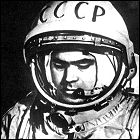 Andrian Nikolayev becomes the third Soviet cosmonaut to reach orbit. Aboard Vostok 3, Nikolayev remains in orbit for almost four days, long enough to become the first space traveler from Earth to have company while in orbit.
Andrian Nikolayev becomes the third Soviet cosmonaut to reach orbit. Aboard Vostok 3, Nikolayev remains in orbit for almost four days, long enough to become the first space traveler from Earth to have company while in orbit.
 British broadcaster ABC airs the seventh episode of science fiction anthology series Out Of This World. Adapted by Bruce Stewart from a story by Katherine Maclean, the story stars Roger Avon, and is introduced by Boris Karloff (in much the same way that Rod Serling introduced episodes of The Twilight Zone). This episode no longer exists in the archives.
British broadcaster ABC airs the seventh episode of science fiction anthology series Out Of This World. Adapted by Bruce Stewart from a story by Katherine Maclean, the story stars Roger Avon, and is introduced by Boris Karloff (in much the same way that Rod Serling introduced episodes of The Twilight Zone). This episode no longer exists in the archives.
More about Out Of This World and Out Of The Unknown in the LogBook
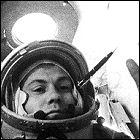 The Soviet Union launches Vostok 4 with Pavel Popovich aboard, while Andrian Nikolayev orbits overhead in Vostok 3. The two vehicles pass within four miles of one another, but with no precision maneuvering, rendezvous or docking equipment, there’s little practical engineering value in the tandem space flight, other than to prove that ground controllers can handle two simultaneous flights. Popovich returns to Earth after nearly three days.
The Soviet Union launches Vostok 4 with Pavel Popovich aboard, while Andrian Nikolayev orbits overhead in Vostok 3. The two vehicles pass within four miles of one another, but with no precision maneuvering, rendezvous or docking equipment, there’s little practical engineering value in the tandem space flight, other than to prove that ground controllers can handle two simultaneous flights. Popovich returns to Earth after nearly three days.